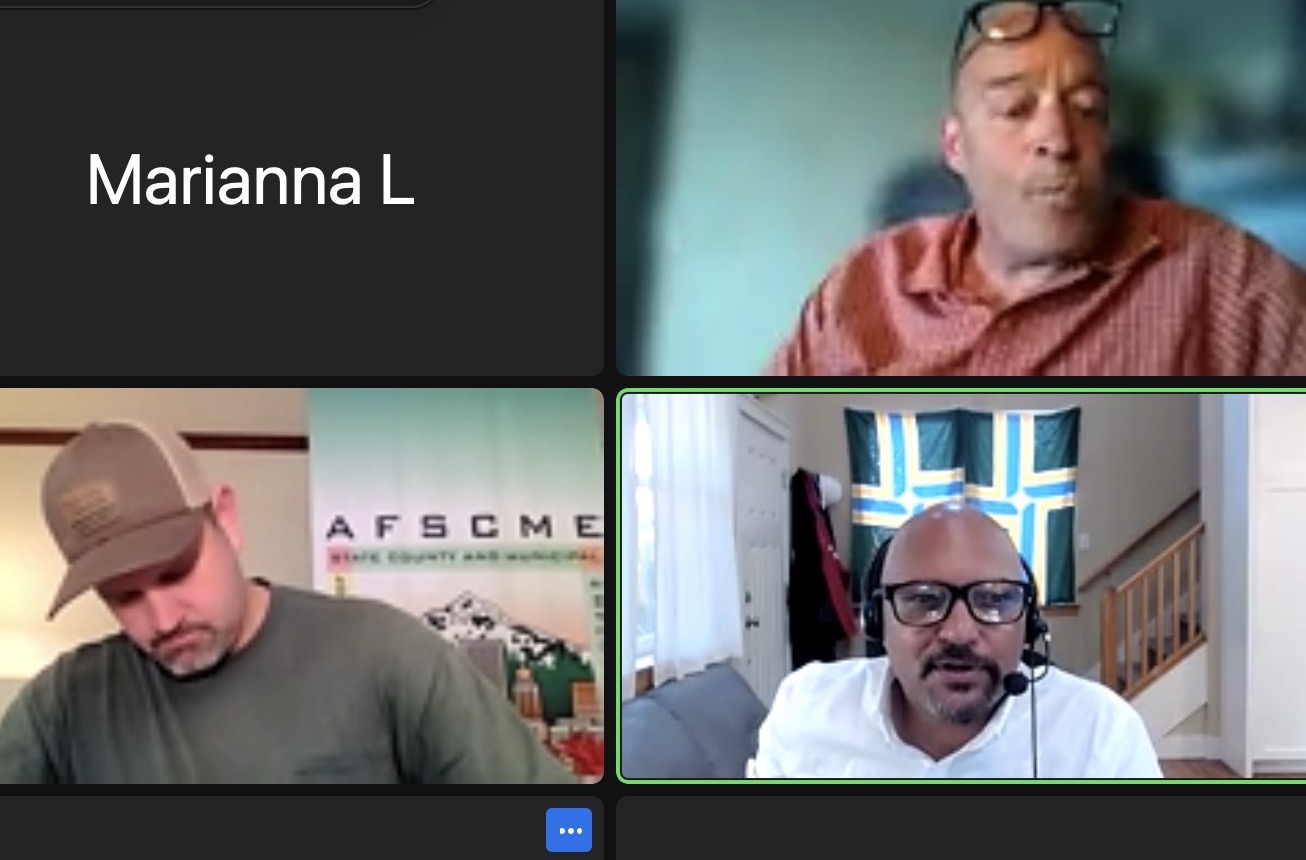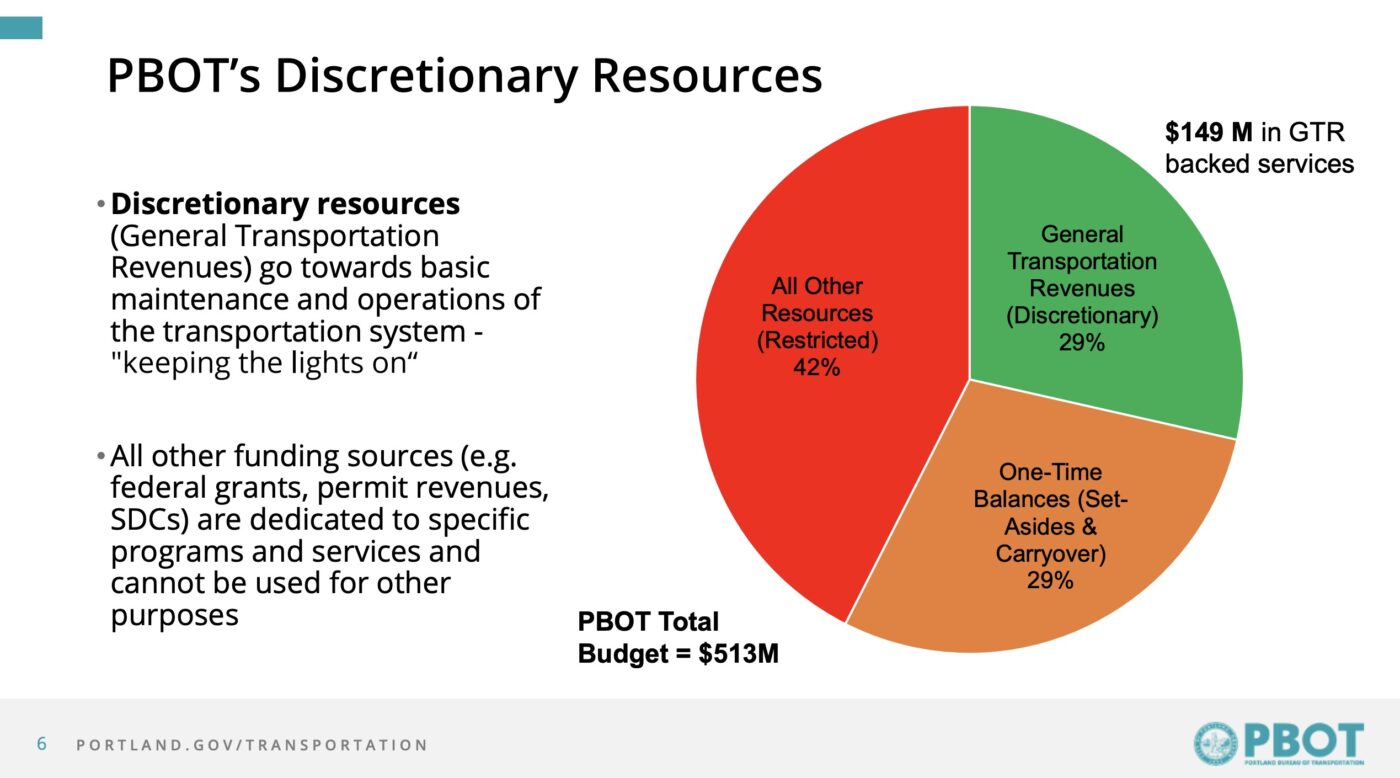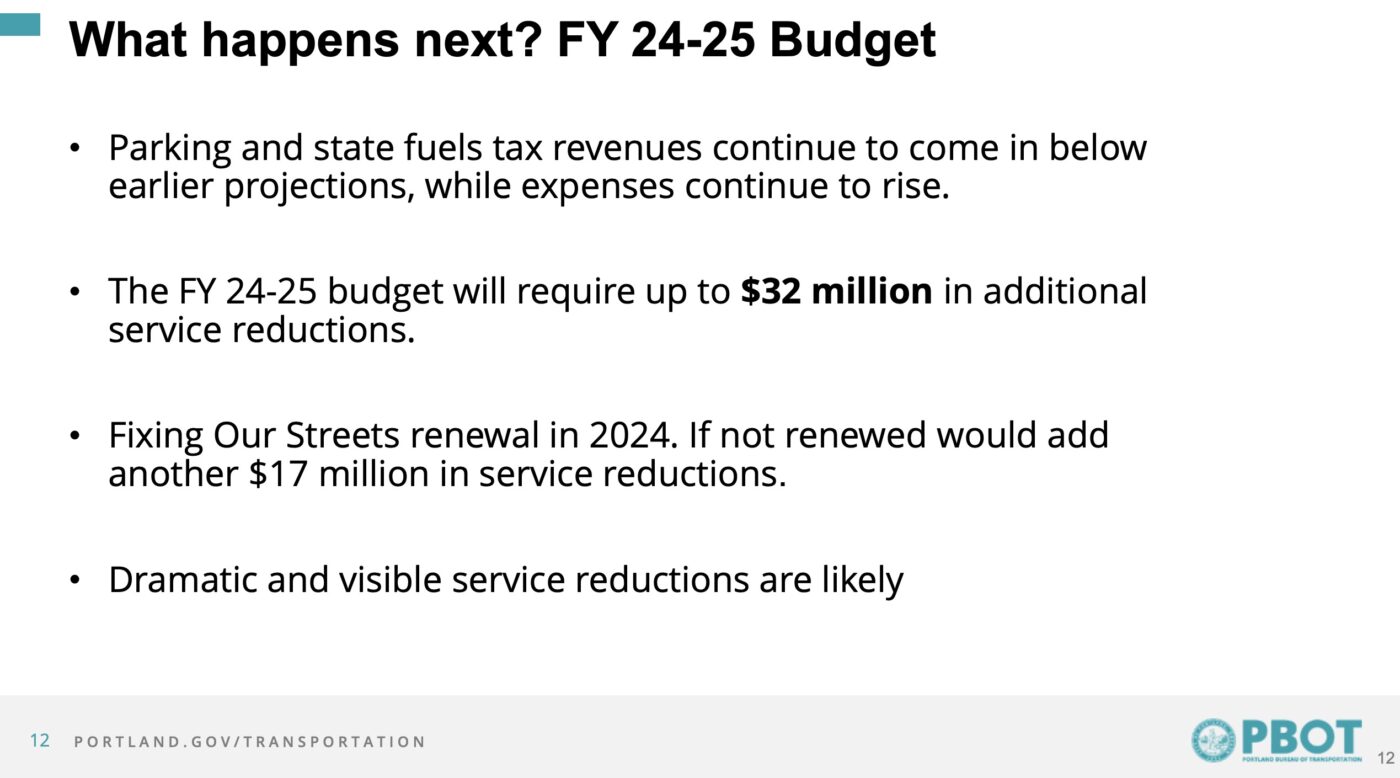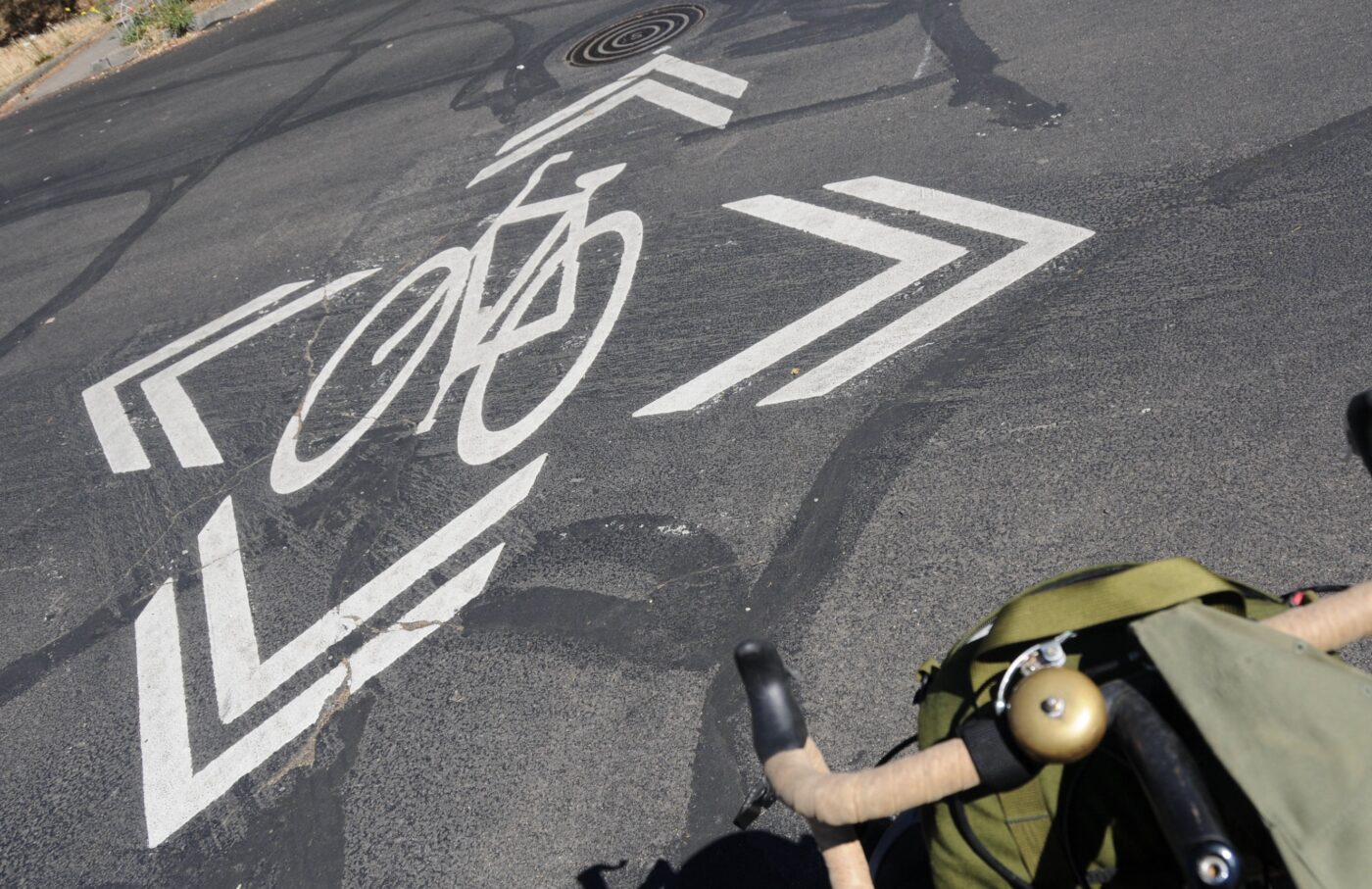A month after a dramatic, last-minute assault on their budget from Mayor Ted Wheeler, staff and advisors for the Portland Bureau of Transportation are coming to terms with reality and trying to forge a path forward.
At a meeting of the PBOT Bureau Budget Advisory Committee (BBAC) Thursday night, committee members plotted next moves and bent the ear of one notable attendee — City Commissioner Mingus Mapps. Mapps, who leads PBOT, needs the BBAC now more than ever. He’s desperate. His largest bureau is in freefall and so far he hasn’t found a parachute.
In addition to current funding woes, PBOT is without a director and suffers from low morale after years of cuts, a recent strike, and harsh daily criticism from a public that once adored them. Meanwhile, key metrics like bicycling rates and traffic deaths are headed in the wrong direction. Mapps tried his best at last night’s meeting to balance candor about the severity of the moment with the positive, inspirational tone it will take to get out of it.

“We are beyond band-aids, now we are doing surgery. And frankly, we’re gonna’ have to find a cure if we’re going to get transportation back on on its feet,”
– Mingus Mapps, city commissioner
“We are beyond band-aids, now we are doing surgery. And frankly, we’re gonna’ have to find a cure if we’re going to get transportation back on on its feet,” he said. And then added, “We are very privileged to be the folks in the transportation space. We get to figure out what this next moment looks like.”
PBOT’s funding problem is not new. It comes from decades of propping up a system that requires more funding than the agency brings in and relies too heavily on driving-related fees — which is the agency’s lowest stated priority. It was a slow-moving train wreck before Covid, then the pandemic — and more recently, politics — hastened a derailment.
Bureau leaders thought they had a bit more breathing room before last month when Mayor Wheeler ambushed their budget. A 40-cent parking meter increase that was already voted on and set to go into effect next month would have staved off the most brutal cuts for at least year. Then Wheeler said he wanted the money back because tax increases are “choking the life out” of Portlanders. Mapps was able to broker a compromise (thanks in large part because labor unions flooded City Hall with concerns) and a 20-cent increase was ultimately adopted.


PBOT Business Services Group Director Jeremy Patton shared last night that receiving half as much from the parking meter increase as they’d expected will mean an additional $4 million of cuts per year starting the fiscal year that begins July 1st 2023 and runs through June 31st, 2024. When added to other cuts into a long-term forecast, Patton said starting in 2024-2025, PBOT will need to cut $32 million a year — an amount equal to about 30-35% of their discretionary, “keeping the lights on” budget. “That is pretty significant,” Patton said with admirable calm.
Mapps wasn’t as measured. “I don’t think my colleagues realize the degree to which the actions they took are going to have some really detrimental impacts on our community,” he said.
The BBAC can help by applying political pressure through writing letters and meeting with other commissioners and their staff. The committee has drafted several letters. They differ in tone, but the asks are the same: reinstate the initial 40-cent parking meter increase, expand paid parking zones to areas outside the central city (like Hawthorne, Division, and so on), and move forward with a transportation utility fee (which Mapps floated briefly last month).
There’s long been dissatisfaction among PBOT advisory committee members that they have limited impact on policy decisions. That idea is being tested like never before at the BBAC right now, and this budget crisis might be the thing that helps them finally mature into a more influential body. They are certainly talking the talk.
“I think we need to push back hard on this thought that we can just cut PBOT’s budget at the last minute and it’s going to be cool,” said BBAC member David Stein. He’s among several committee members who want to sharpen the BBAC’s tone. “These cuts are endangering the economic health of the city and the actual physical safety of citizens and in the long run, they will cost taxpayers more money,” said BBAC co-chair Susan Johnson.
And Ignacio Simon, the most outspoken member of the committee, wrote in a draft letter, “The citizenry should not have to beg its government to act in the city’s best interest.”
What is the city’s best interest? That of course is open for debate.
Simon, Stein, and other members of the BBAC think now is the time to transition PBOT away from their car-centric funding model (based on gas taxes and parking fees) and its perverse incentives that tie the agency to its avowed enemy.
When Simon told Mapps he was concerned that PBOT’s budget is too tied to driving, the commissioner agreed. “Ironically even as we win, we lose,” Mapps replied. And then he asked Simon, “What alternative funding mechanisms appeal to you?”
Simon said he’d like to see new fees and taxes that would disincentivize people from driving large vehicles. He also said he supports the transportation utility fee and more paid parking areas citywide — an idea Mapps said PBOT “will be exploring.”
Parking fees aren’t the only thing Mapps will explore in the coming months. He and his team at PBOT are laying groundwork to renew the Fixing Our Streets local gas tax increase first passed by voters in 2016. It’s due for a vote next year and there’s a lot of talk about what to put on the ballot. Should PBOT ask for more than 10-cents? Should they try to index the amount to inflation? Should they remove the four-year term?
PBOT Resources Manager (and veteran of many funding debates over the years) Mark Lear said, “We joke around about going from Fixing Our Streets II, to Fixing Our Streets forever.” He also added that PBOT’s preferred approach would be to index the gas tax to inflation, even though Portland would be the first city in Oregon to do so.
Mapps liked the indexing idea too. After one BBAC member suggested indexing parking fees and the local gas tax to inflation, Mapps said, “I like those ideas. That’s one thing which I think we need to change.”
Amid all this, PBOT has been directed by city council to update their strategic plan to (in Mapps’ words), “find a closer relationship between the bureau’s mission and the resources we have.” Will doing that lead to any changes? “I’m a little skeptical,” Mapps said about the exercise. “I think our core plan is still sound and I can’t imagine us moving away from any of our core missions.”
Instead of changing the goalposts, Mapps wants to change how the game is played. “The elephant in the room is PBOT’s broken and outmoded mechanism for funding itself. I think this is a moment when we as a city need to come together and figure out how we’re going to fund transportation for the 21st century.”
Mapps’ first test will be during next year’s budget talks when he plans to go after the city’s general fund dollars to help keep PBOT afloat. One of PBOT’s afflictions is how very little of their funding comes from the (highly competitive) general fund and can’t be used for maintenance and everyday operational expenses. When he makes major general fund requests next year, Mapps thinks it will, “Profoundly change the dynamics” at city council.
“They’re not going to like that,” Mapps said about his general fund strategy. “And I think it will create some incentives for my colleagues to get PBOT back on sound financial ground, because once PBOT moves into the general fund you’re competing… everyone is going to have to sacrifice to make our transportation system work.”
From here, PBOT will roll out a public opinion poll and do outreach to help them craft the right package of cuts that will balance their budget while they continue to consider new revenue ideas. That will lead them right into conversations about the 2024-2025 budget with city councilors later this fall.
There are many important conversations in the weeks and months ahead that could change PBOT forever. Stay tuned.




